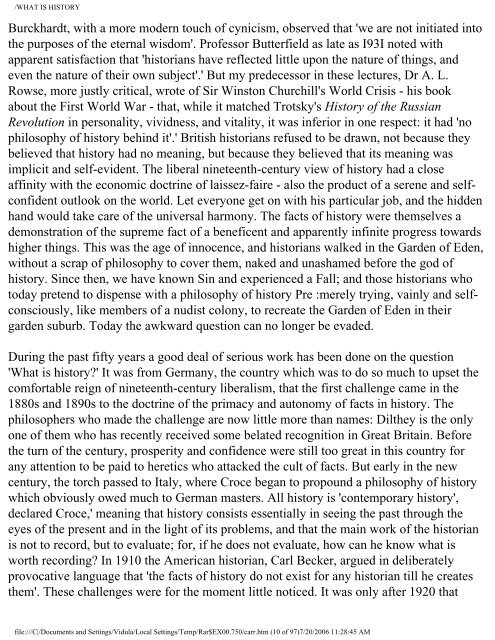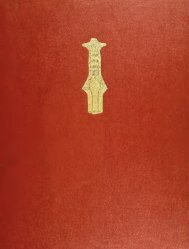What is History / by Edward Hallett Carr - Universal History Library
What is History / by Edward Hallett Carr - Universal History Library
What is History / by Edward Hallett Carr - Universal History Library
Create successful ePaper yourself
Turn your PDF publications into a flip-book with our unique Google optimized e-Paper software.
WHAT IS HISTORY<br />
Burckhardt, with a more modern touch of cynic<strong>is</strong>m, observed that 'we are not initiated into<br />
the purposes of the eternal w<strong>is</strong>dom'. Professor Butterfield as late as I93I noted with<br />
apparent sat<strong>is</strong>faction that 'h<strong>is</strong>torians have reflected little upon the nature of things, and<br />
even the nature of their own subject'.' But my predecessor in these lectures, Dr A. L.<br />
Rowse, more justly critical, wrote of Sir Winston Churchill's World Cr<strong>is</strong><strong>is</strong> - h<strong>is</strong> book<br />
about the First World War - that, while it matched Trotsky's H<strong>is</strong>tory of the Russian<br />
Revolution in personality, vividness, and vitality, it was inferior in one respect: it had 'no<br />
philosophy of h<strong>is</strong>tory behind it'.' Brit<strong>is</strong>h h<strong>is</strong>torians refused to be drawn, not because they<br />
believed that h<strong>is</strong>tory had no meaning, but because they believed that its meaning was<br />
implicit and self-evident. The liberal nineteenth-century view of h<strong>is</strong>tory had a close<br />
affinity with the economic doctrine of la<strong>is</strong>sez-faire - also the product of a serene and selfconfident<br />
outlook on the world. Let everyone get on with h<strong>is</strong> particular job, and the hidden<br />
hand would take care of the universal harmony. The facts of h<strong>is</strong>tory were themselves a<br />
demonstration of the supreme fact of a beneficent and apparently infinite progress towards<br />
higher things. Th<strong>is</strong> was the age of innocence, and h<strong>is</strong>torians walked in the Garden of Eden,<br />
without a scrap of philosophy to cover them, naked and unashamed before the god of<br />
h<strong>is</strong>tory. Since then, we have known Sin and experienced a Fall; and those h<strong>is</strong>torians who<br />
today pretend to d<strong>is</strong>pense with a philosophy of h<strong>is</strong>tory Pre :merely trying, vainly and selfconsciously,<br />
like members of a nud<strong>is</strong>t colony, to recreate the Garden of Eden in their<br />
garden suburb. Today the awkward question can no longer be evaded.<br />
During the past fifty years a good deal of serious work has been done on the question<br />
'<strong>What</strong> <strong>is</strong> h<strong>is</strong>tory?' It was from Germany, the country which was to do so much to upset the<br />
comfortable reign of nineteenth-century liberal<strong>is</strong>m, that the first challenge came in the<br />
1880s and 1890s to the doctrine of the primacy and autonomy of facts in h<strong>is</strong>tory. The<br />
philosophers who made the challenge are now little more than names: Dilthey <strong>is</strong> the only<br />
one of them who has recently received some belated recognition in Great Britain. Before<br />
the turn of the century, prosperity and confidence were still too great in th<strong>is</strong> country for<br />
any attention to be paid to heretics who attacked the cult of facts. But early in the new<br />
century, the torch passed to Italy, where Croce began to propound a philosophy of h<strong>is</strong>tory<br />
which obviously owed much to German masters. All h<strong>is</strong>tory <strong>is</strong> 'contemporary h<strong>is</strong>tory',<br />
declared Croce,' meaning that h<strong>is</strong>tory cons<strong>is</strong>ts essentially in seeing the past through the<br />
eyes of the present and in the light of its problems, and that the main work of the h<strong>is</strong>torian<br />
<strong>is</strong> not to record, but to evaluate; for, if he does not evaluate, how can he know what <strong>is</strong><br />
worth recording? In 1910 the American h<strong>is</strong>torian, Carl Becker, argued in deliberately<br />
provocative language that 'the facts of h<strong>is</strong>tory do not ex<strong>is</strong>t for any h<strong>is</strong>torian till he creates<br />
them'. These challenges were for the moment little noticed. It was only after 1920 that<br />
file:///C|/Documents and Settings/Vidula/Local Settings/Temp/Rar$EX00.750/carr.htm (10 of 97)7/20/2006 11:28:45 AM







